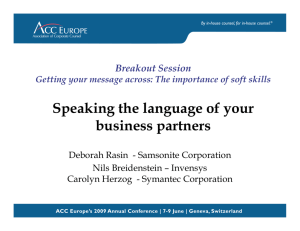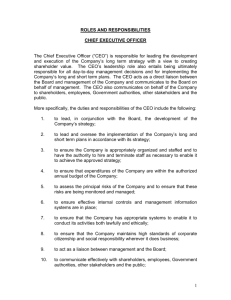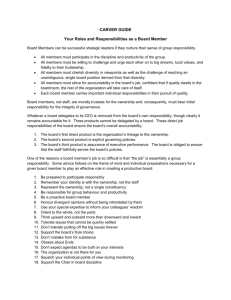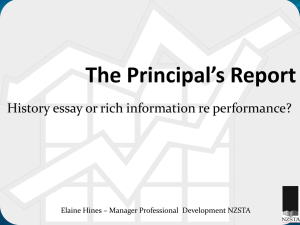Hypothetical I You are the general counsel of a public company, and
advertisement
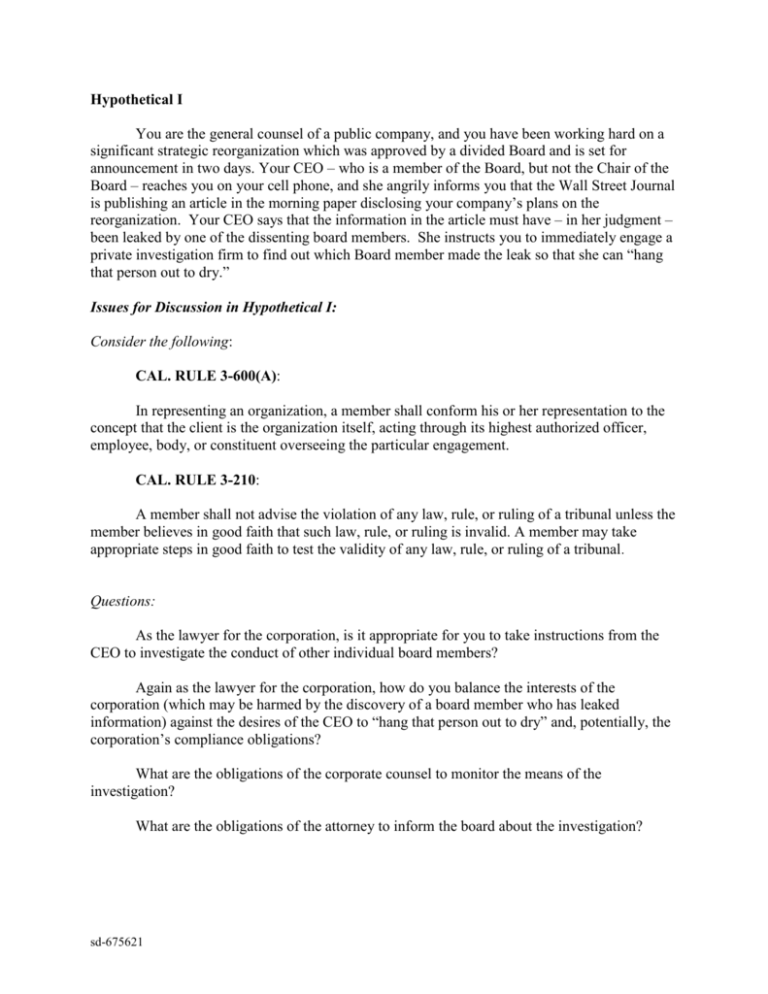
Hypothetical I You are the general counsel of a public company, and you have been working hard on a significant strategic reorganization which was approved by a divided Board and is set for announcement in two days. Your CEO – who is a member of the Board, but not the Chair of the Board – reaches you on your cell phone, and she angrily informs you that the Wall Street Journal is publishing an article in the morning paper disclosing your company’s plans on the reorganization. Your CEO says that the information in the article must have – in her judgment – been leaked by one of the dissenting board members. She instructs you to immediately engage a private investigation firm to find out which Board member made the leak so that she can “hang that person out to dry.” Issues for Discussion in Hypothetical I: Consider the following: CAL. RULE 3-600(A): In representing an organization, a member shall conform his or her representation to the concept that the client is the organization itself, acting through its highest authorized officer, employee, body, or constituent overseeing the particular engagement. CAL. RULE 3-210: A member shall not advise the violation of any law, rule, or ruling of a tribunal unless the member believes in good faith that such law, rule, or ruling is invalid. A member may take appropriate steps in good faith to test the validity of any law, rule, or ruling of a tribunal. Questions: As the lawyer for the corporation, is it appropriate for you to take instructions from the CEO to investigate the conduct of other individual board members? Again as the lawyer for the corporation, how do you balance the interests of the corporation (which may be harmed by the discovery of a board member who has leaked information) against the desires of the CEO to “hang that person out to dry” and, potentially, the corporation’s compliance obligations? What are the obligations of the corporate counsel to monitor the means of the investigation? What are the obligations of the attorney to inform the board about the investigation? sd-675621 Hypothetical II You are an attorney working in the legal department, and you are working with the CEO on the sale of one of the operating divisions of your company. Buyer prepares the initial draft of the agreement, which includes a non-competition covenant binding on your company. The noncompetition covenant provides that the exclusive remedy for a breach by your company of its covenant is the return of the consideration allocated to that covenant. In the initial draft, $3M of the $5M total consideration is allocated to the non-competition covenant. After negotiations, to minimize the tax costs to your client, the buyer agrees to reduce the amount allocated to the noncompetition covenant to $1, and buyer prepares a revised draft reflecting this change. The buyer fails to make any change to the remedies section – the effect of which is that the buyer’s only remedy for a breach of the covenant is $1, rendering the covenant meaningless. When you call this issue to the attention of your CEO, she instructs you to say nothing. What should you do? Note to Panelists: Please review Formal Opinion No. 2013-189 included with the materials. Hypothetical III You have completed the negotiation and documentation of a purchase and sale agreement where your company is the seller. The buyer is represented by competent counsel. At the closing, the buyer delivers the closing statement and funds flow memo which contains a clear error that results in a substantial overpayment to your company. You inform your CEO of this error, and he instructs you to say nothing. What should you do? Note to Panelists: Please review “Lawyer’s Duty to Disclose Mistakes in Commercial Closing” included with the materials. Hypothetical IV The general counsel of a U.S. corporation listed on a foreign exchange, who is by training a real estate lawyer, has been recently appointed to his position, which required him to move his family to a new city and state in order to obtain a significant increase in compensation and responsibility. The CEO of the company is an imperious personality with a track record for doing deals quickly and successfully. Shortly after assuming his position, the general counsel is directed to prepare a series of non-competition agreements in connection with divestitures which provide for substantial payments to the CEO and other senior managers. The general counsel has no direct involvement in the negotiations, and he is not invited to the board meetings. Later, it is revealed that the non-competition payments were part of a scheme by the CEO and other senior managers to siphon proceeds from the deals for their personal benefit. The general counsel received no personal benefit from the scheme. Issues for Discussion in Hypothetical IV: Consider the following: Cal Rule 3-600: sd-675621 (B) If a member acting on behalf of an organization knows that an actual or apparent agent of the organization acts or intends or refuses to act in a manner that is or may be a violation of law reasonably imputable to the organization, or in a manner which is likely to result in substantial injury to the organization, the member shall not violate his or her duty of protecting all confidential information as provided in Business and Professions Code section 6068, subdivision (e). Subject to Business and Professions Code section 6068, subdivision (e), the member may take such actions as appear to the member to be in the best lawful interest of the organization. Such actions may include among others: (1) Urging reconsideration of the matter while explaining its likely consequences to the organization; or (2) Referring the matter to the next higher authority in the organization, including, if warranted by the seriousness of the matter, referral to the highest internal authority that can act on behalf of the organization. (C) If, despite the member's actions in accordance with paragraph (B), the highest authority that can act on behalf of the organization insists upon action or a refusal to act that is a violation of law and is likely to result in substantial injury to the organization, the member's response is limited to the member's right, and, where appropriate, duty to resign in accordance with rule 3700. Cal Rule 3-110: (A) A member shall not intentionally, recklessly, or repeatedly fail to perform legal services with competence. (B) For purposes of this rule, "competence" in any legal service shall mean to apply the 1) diligence, 2) learning and skill, and 3) mental, emotional, and physical ability reasonably necessary for the performance of such service. (C) If a member does not have sufficient learning and skill when the legal service is undertaken, the member may nonetheless perform such services competently by 1) associating with or, where appropriate, professionally consulting another lawyer reasonably believed to be competent, or 2) by acquiring sufficient learning and skill before performance is required. Discussion in Rule 3-110: The duties set forth in rule 3-110 include the duty to supervise the work of subordinate attorney and non-attorney employees or agents. In an emergency a lawyer may give advice or assistance in a matter in which the lawyer does not have the skill ordinarily required where referral to or consultation with another lawyer would be impractical. Even in an emergency, however, assistance should be limited to that reasonably necessary in the circumstances. Questions: Did the general counsel do anything unethical as a lawyer in his situation? Was he competent to do what he was asked to do? Was he assisting with a fraud? What should he have done? sd-675621 How should an in-house lawyer deal with a situation in which he/she feels she may not be competent to address the specific issue at hand but the lawyer’s managers insist the lawyer handle the matter nonetheless? What should an in-house lawyer do if s/he suspects that s/he is being asked to participate in a fraud similar to a situation that faced the general counsel where he seems not to have had all the facts? Case Study I Google issued over $80 million worth of stock options to employees and consultants in the two years preceding its IPO without registering the offering or providing the required disclosures. General Counsel David Drummond was aware that the registration and disclosure obligations had been triggered, but he consulted outside counsel and believed that Google might be entitled to rely on an exemption from the law. Drummond considered the fact that the violation could be remedied by making a rescission offer to the employees at a later date. Drummond advised the board that it could issue options, but failed to inform the board that the registration and disclosure obligations had been triggered or that there were risks in relying on the exemption, which was in fact inapplicable. To settle the charges, Google and Drummond agreed to cease and desist from violating the registration and disclosure requirements. Issues for Discussion in Case Study I: Consider the following: Cal Rule 3-210: A member shall not advise the violation of any law, rule, or ruling of a tribunal unless the member believes in good faith that such law, rule, or ruling is invalid. A member may take appropriate steps in good faith to test the validity of any law, rule, or ruling of a tribunal. Questions: Step back from the case study, and let’s discuss what the obligation of the corporation’s lawyer when the corporation faces a legal risk that apparently has limited consequences. That is, can the general counsel advise the corporation that it is acceptable to take an action that is the moral equivalent of speeding on an empty highway? Take it a step further, can the general counsel simply decide that it is within her purview to accept certain non-compliance risks on behalf of the corporation without advising other corporate constituencies? Did Drummond behave unethically? How? If yes, would Drummond have been exonerated if he had fully informed the board? When is it ok to advise your client that they can pursue a course of action which is likely, but not definitely, a violation of law? Does it matter if the remedy is simple as it was in this case through rescission? What if the penalties are immaterial? sd-675621 Hypothetical V You are in-house general counsel of a private company which is wholly-owned by the CEO who is also the sole director. You learn from an inadvertent slip-up by the CFO that the corporation has presented intentionally false financial statements to its auditor and its lender in order to buy time until the negotiations on a big customer contract are complete. The CFO assures you that the customer contract will provide for payments that will put the company in a position to refinance its credit facility with a new lender. The CEO is fully aware of the situation and has directed the CFO to submit the false financial statements. He tells you that it is his decision and that you are to keep quiet about it. Questions: What should the lawyer do? Does the answer change if the CEO is not the sole shareholder? Assume there is an independent board. Change the hypothetical to consider what your position is if the false information is being submitted to a regulator. Hypothetical VI You are in-house counsel to a private company, and you are interviewing a senior company executive as part of an internal investigation. You have some suspicions, but no real evidence, that the officer may have engaged in unlawful conduct which could subject the company to liability and the officer to termination and potential criminal or civil penalties. The company’s employee policies require employees to cooperate with the legal department. Issues for Discussion in Hypothetical VI: Consider the following: Cal. Rule 3-600(D): In dealing with an organization's directors, officers, employees, members, shareholders, or other constituents, a member shall explain the identity of the client for whom the member acts, whenever it is or becomes apparent that the organization's interests are or may become adverse to those of the constituent(s) with whom the member is dealing. The member shall not mislead such a constituent into believing that the constituent may communicate confidential information to the member in a way that will not be used in the organization's interest if that is or becomes adverse to the constituent. Questions: sd-675621 Assume that the officer does not know you suspect him of unlawful activity. What, if anything, do you advise the officer regarding your role? Now assume that the officer knows he is suspected and asks you if he should obtain a lawyer before proceeding with the interview? How do you respond? Now assume that the officer is on the board and a significant shareholder? How do you respond? Hypothetical VII You are general counsel of a small public company. You get a call from your outside auditor to discuss the CEO’s expense reimbursements. It seems the CEO has submitted requests for reimbursement in excess of $20,000 per month, many times without appropriate backup documentation. The auditor tells you that the issue is not material with respect to the financial statements as a whole. Many of the requests are arguably personal – bar tabs, front row seats for the Lakers and expensive purchases of watches and computer equipment characterized as client gifts. You also recall the CEO recently dismissed a member of the accounting staff after a dispute which you seem to remember involved expense reimbursement. You call the Chairman of the Board who says “let me handle it.” The Chairman calls you back a week later and says he has investigated the situation, is comfortable doing nothing and that the CEO will “clean up his act in the future.” You do nothing. Have you done the right thing? Hypothetical VIII You are the general counsel of a public company, and the chair of the nominating and governance committee calls you. She says that she has a confidential matter to discuss with you, and that she needs assurance from you that you will not reveal anything about this conversation to the CEO (who is also the chairman of the board). Can you give her that assurance? Assuming you proceed with the conversation, she informs you that the independent board members have determined to terminate the CEO. She needs your assistance in evaluating the CEO’s rights as an employee and as a director. Does it make a difference whether the proper corporate formalities have been undertaken? Do you need verification of those formalities? Assume you decide you can advise the independent board members and you participate in meetings where the termination and succession details are hammered out, including even the employment agreement for the new CEO. Unexpectedly, the CEO comes to you and says that she has learned that the Board is planning to terminate her. The CEO asks you to help her formulate a plan to defeat the Board. The plan involves orchestrating a rebellion by the management team and enlisting stockholders friendly to the CEO. Can you help her? Do you need to disclose any of this to the independent board members? Can you? sd-675621


